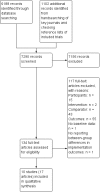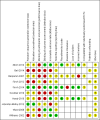Strategies to improve the implementation of healthy eating, physical activity and obesity prevention policies, practices or programmes within childcare services
- PMID: 27699761
- PMCID: PMC6458009
- DOI: 10.1002/14651858.CD011779.pub2
Strategies to improve the implementation of healthy eating, physical activity and obesity prevention policies, practices or programmes within childcare services
Update in
-
Strategies to improve the implementation of healthy eating, physical activity and obesity prevention policies, practices or programmes within childcare services.Cochrane Database Syst Rev. 2020 Feb 10;2(2):CD011779. doi: 10.1002/14651858.CD011779.pub3. Cochrane Database Syst Rev. 2020. PMID: 32036618 Free PMC article.
Abstract
Background: Despite the existence of effective interventions and best-practice guideline recommendations for childcare services to implement policies, practices and programmes to promote child healthy eating, physical activity and prevent unhealthy weight gain, many services fail to do so.
Objectives: The primary aim of the review was to examine the effectiveness of strategies aimed at improving the implementation of policies, practices or programmes by childcare services that promote child healthy eating, physical activity and/or obesity prevention. The secondary aims of the review were to:1. describe the impact of such strategies on childcare service staff knowledge, skills or attitudes;2. describe the cost or cost-effectiveness of such strategies;3. describe any adverse effects of such strategies on childcare services, service staff or children;4. examine the effect of such strategies on child diet, physical activity or weight status.
Search methods: We searched the following electronic databases on 3 August 2015: the Cochrane Central Register of Controlled trials (CENTRAL), MEDLINE, MEDLINE In Process, EMBASE, PsycINFO, ERIC, CINAHL and SCOPUS. We also searched reference lists of included trials, handsearched two international implementation science journals and searched the World Health Organization International Clinical Trials Registry Platform (www.who.int/ictrp/) and ClinicalTrials.gov (www.clinicaltrials.gov).
Selection criteria: We included any study (randomised or non-randomised) with a parallel control group that compared any strategy to improve the implementation of a healthy eating, physical activity or obesity prevention policy, practice or programme by staff of centre-based childcare services to no intervention, 'usual' practice or an alternative strategy.
Data collection and analysis: The review authors independently screened abstracts and titles, extracted trial data and assessed risk of bias in pairs; we resolved discrepancies via consensus. Heterogeneity across studies precluded pooling of data and undertaking quantitative assessment via meta-analysis. However, we narratively synthesised the trial findings by describing the effect size of the primary outcome measure for policy or practice implementation (or the median of such measures where a single primary outcome was not stated).
Main results: We identified 10 trials as eligible and included them in the review. The trials sought to improve the implementation of policies and practices targeting healthy eating (two trials), physical activity (two trials) or both healthy eating and physical activity (six trials). Collectively the implementation strategies tested in the 10 trials included educational materials, educational meetings, audit and feedback, opinion leaders, small incentives or grants, educational outreach visits or academic detailing. A total of 1053 childcare services participated across all trials. Of the 10 trials, eight examined implementation strategies versus a usual practice control and two compared alternative implementation strategies. There was considerable study heterogeneity. We judged all studies as having high risk of bias for at least one domain.It is uncertain whether the strategies tested improved the implementation of policies, practices or programmes that promote child healthy eating, physical activity and/or obesity prevention. No intervention improved the implementation of all policies and practices targeted by the implementation strategies relative to a comparison group. Of the eight trials that compared an implementation strategy to usual practice or a no intervention control, however, seven reported improvements in the implementation of at least one of the targeted policies or practices relative to control. For these trials the effect on the primary implementation outcome was as follows: among the three trials that reported score-based measures of implementation the scores ranged from 1 to 5.1; across four trials reporting the proportion of staff or services implementing a specific policy or practice this ranged from 0% to 9.5%; and in three trials reporting the time (per day or week) staff or services spent implementing a policy or practice this ranged from 4.3 minutes to 7.7 minutes. The review findings also indicate that is it uncertain whether such interventions improve childcare service staff knowledge or attitudes (two trials), child physical activity (two trials), child weight status (two trials) or child diet (one trial). None of the included trials reported on the cost or cost-effectiveness of the intervention. One trial assessed the adverse effects of a physical activity intervention and found no difference in rates of child injury between groups. For all review outcomes, we rated the quality of the evidence as very low. The primary limitation of the review was the lack of conventional terminology in implementation science, which may have resulted in potentially relevant studies failing to be identified based on the search terms used in this review.
Authors' conclusions: Current research provides weak and inconsistent evidence of the effectiveness of such strategies in improving the implementation of policies and practices, childcare service staff knowledge or attitudes, or child diet, physical activity or weight status. Further research in the field is required.
Conflict of interest statement
Luke Wolfenden, Jannah Jones, Meghan Finch, Rebecca Wyse, John Wiggers, Kirsty Seward and Sze Lin Yoong are currently undertaking a series of randomised trials aiming to facilitate the implementation of healthy eating and physical activity policies and practices by childcare services. The authors have not received any benefit, in cash or kind, any hospitality, or any subsidy derived from any source perceived to have an interest in the outcome of the review. Christopher Williams, Melanie Kingsland, Flora Tzelepis, Amanda J Williams, Tameka Small, Vivian Welch and Debbie Booth declare no conflict of interest.
Figures
References
References to studies included in this review
-
- Alkon A, Crowley AA, Benjamin Neelon SE, Hill S, Pan Y, Nguyen V, et al. Nutrition and physical activity randomized control trial in child care centers improves knowledge, policies, and children's body mass index. BMC Public Health 2014;14(215):1‐13. [DOI: 10.1186/1471-2458-14-215] - DOI - PMC - PubMed
-
- Bell AC, Davies L, Finch M, Wolfenden L, Francis JL, Sutherland R, et al. An implementation intervention to encourage healthy eating in centre‐based child‐care services: impact of the Good for Kids Good for Life programme. Public Health Nutrition 2014;18(9):1610‐9. [DOI: 10.1017/S1368980013003364] - DOI - PMC - PubMed
-
- Finch M, Wolfenden L, Falkiner M, Edenden D, Pond N, Hardy LL, et al. Impact of a population based intervention to increase the adoption of multiple physical activity practices in centre based childcare services: a quasi experimental, effectiveness study. International Journal of Behavioral Nutrition and Physical Activity 2012;9(101):1‐13. [DOI: 10.1186/1479-5868-9-101] - DOI - PMC - PubMed
-
- Finch M, Wolfenden L, Morgan PJ, Freund M, Jones J, Wiggers J. A cluster randomized trial of a multi‐level intervention, delivered by service staff, to increase physical activity of children attending center‐based childcare. Preventive Medicine 2014;58:9‐16. [DOI: 10.1016/j.ypmed.2013.10.004] - DOI - PubMed
References to studies excluded from this review
-
- Agrawal T, Hoffman JA, Ahl M, Bhaumik U, Healey C, Carter S, et al. Collaborating for impact: a multilevel early childhood obesity prevention initiative. Family and Community Health 2012;35(3):192‐202. - PubMed
-
- Alhassan S, Nwaokelemeh O, Lyden K, Goldsby T, Mendoza A. A pilot study to examine the effect of additional structured outdoor playtime on preschoolers' physical activity levels. Child Care in Practice 2013;19(1):23‐35.
-
- Alhassan S, Whitt‐Glover MC. Intervention fidelity in a teacher‐led program to promote physical activity in preschool‐age children. Preventive Medicine 2014;69:S34‐6. - PubMed
References to ongoing studies
-
- Duke University. Baby NAP SACC Intervention Study. https://clinicaltrials.gov/ct2/show/NCT01890681?term=childcare&rank=15.
-
- Finch M, Yoong SL, Thomson RJ, Seward K, Cooney M, Jones J, et al. A pragmatic randomised controlled trial of an implementation intervention to increase healthy eating and physical activity‐promoting policies, and practices in centre‐based childcare services: study protocol. BMJ Open 2015;5(5):e006706. - PMC - PubMed
-
- Université de Sherbrooke. Healthy Start to Increase Physical Activity and Improve Healthy Eating in Early Childcare Centres. https://clinicaltrials.gov/show/NCT02375490/.
Additional references
-
- Adams J, Zask A, Dietrich U. Tooty Fruity Vegie in Preschools: an obesity prevention intervention in preschools targeting children's movement skills and eating behaviours. Health Promotion Journal of Australia 2009;20:112‐9. - PubMed
-
- Agency for Healthcare Research and Quality. Diffusion and dissemination of evidence‐based cancer control interventions. Agency for Healthcare Research and Quality2003.
-
- Arditi C, Rège‐Walther M, Wyatt JC, Durieux P, Burnand B. Computer‐generated reminders delivered on paper to healthcare professionals; effects on professional practice and health care outcomes. Cochrane Database of Systematic Reviews 2012, Issue 12. [DOI: 10.1002/14651858.CD001175.pub3] - DOI - PubMed
-
- Ball SC, Benjamin SE, Ward DS. Dietary intakes in North Carolina child‐care centers: are children meeting current recommendations. Journal of the American Dietetic Association 2008;108(4):718‐21. - PubMed
References to other published versions of this review
-
- Wolfenden L, Jones J, Finch M, Wyse RJ, Yoong SL, Steele EJ, et al. Strategies to improve the implementation of healthy eating, physical activity and obesity prevention policies, practices or programmes within childcare services. Cochrane Database of Systematic Reviews 2015, Issue 7. [DOI: 10.1002/14651858.CD011779] - DOI - PMC - PubMed
Publication types
MeSH terms
LinkOut - more resources
Full Text Sources
Other Literature Sources
Medical




